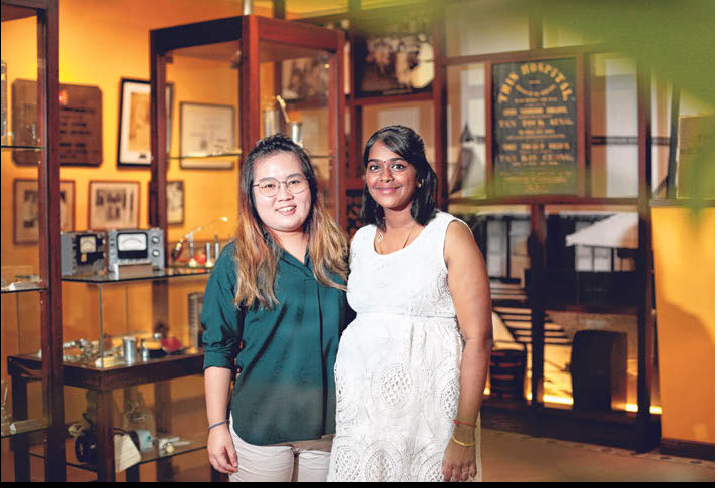Childcare teacher given time off for clinic visits; TB control unit reassured parents about situation
The Straits Times (23 March 2019) - Just two weeks after giving birth to her first child in 2015, Mrs K. Durga found herself back in the hospital.

Childcare teacher K. Durga with her boss Lim Cai Ying, principal of Star Learners childcare centre in Woodlands Circle. Mrs Durga, who is almost due to give birth to her third child, was diagnosed with tuberculosis while she was on maternity leave for her first child.
ST PHOTO: GIN TAY
The childcare teacher had been experiencing chest pains and had difficulty breathing. A chest X-ray showed fluid in her lungs.
She was hospitalised twice in the next month as doctors suspected pneumonia, and was separated from her baby for up to a week at a time. Just as she thought she was getting better, she was diagnosed with tuberculosis.
Said Mrs Durga, 29, who is pregnant with her third child: "I remember crying and asking the doctor for a hug. I hadn't been wearing a mask at home, so the first thing that came to my mind was whether my child would be affected."
As a precaution, the TB Control Unit (TBCU) at Tan Tock Seng Hospital (TTSH) screened her close contacts such as family members and colleagues for TB. Fortunately, none was affected.
Today, Mrs Durga is sharing her story to raise awareness of the disease for the annual World Tuberculosis Day, which falls on March 24.
Most TB patients are cured after six to nine months if they keep up with their treatment regime, said Dr Cynthia Chee, director and senior consultant at the TBCU.
In Singapore, this typically means that the patient takes four drugs daily while supervised by a nurse under a programme called Directly Observed Therapy (DOT).
Dr Chee said: "The treatment takes a long time. Many patients feel better after one or two months, so they think they can stop the treatment. But if they don't complete it, they can become infectious again or have a relapse.
"That's why DOT, which ensures that every patient finishes the treatment properly, is so important."
For Mrs Durga, the ordeal lasted more than 18 months, from October 2015 to May 2017, as she had a strain of TB resistant to Rifampicin, the most important of the four drugs used in TB treatment.
Although Mrs Durga was still on maternity leave when she was diagnosed, her boss Lim Cai Ying, principal of Star Learners childcare centre in Woodlands Circle, had to inform the children's parents that a person at the centre had TB.
Ms Lim, 30, said: "At first, I was quite shocked. The only thing I knew about this condition was that it was highly contagious."
But doctors from the TBCU explained to her that TB patients are no longer contagious after the second week of treatment and can return to work. The unit held a dialogue to reassure parents that the situation was under control.
Under DOT, Mrs Durga had to make daily visits to the polyclinic. When she returned to work in December 2015, she had to either wake up early to go to the polyclinic before going to work or use her lunch time to do so.
On days when her schedule made this impossible, she would go to a clinic at TTSH after office hours.
While she found the daily trips to the polyclinic often frustrating, Mrs Durga said Ms Lim's support in giving her flexible time off helped her stick with the treatment regime.
Ms Lim said: "Even with her absences, which we could accommodate, she tried her best to keep her attendance regular.
"In terms of delivering the curriculum and handling the children, her illness did not compromise her work performance."
To protect Mrs Durga's privacy, the TBCU and the school did not reveal her identity to the parents.
While most of the parents were understanding, some chose to withdraw their children from the centre.
Still, Ms Lim said she never considered terminating Mrs Durga's employment as she is "very responsible" and has been working at the centre for eight years.
"There are many myths about TB that are just not true. As employers, we should be more informed and find out how we can support our staff, not put them through more emotional trauma by further stigmatising them," she added.
Ahead of World TB Day tomorrow, non-profit healthcare provider Sata CommHealth and
TTSH signed a memorandum of understanding yesterday to renew their DOT&Shop programme, which offers supermarket vouchers to needy TB patients as an incentive to complete DOT.
Since it was launched in 2009, the programme has disbursed more than $600,000 worth of vouchers to over 2,200 patients.
From this year, the programme will also offer cash reimbursements to defray transport costs for selected needy TB patients, after assessment by a medical social worker.